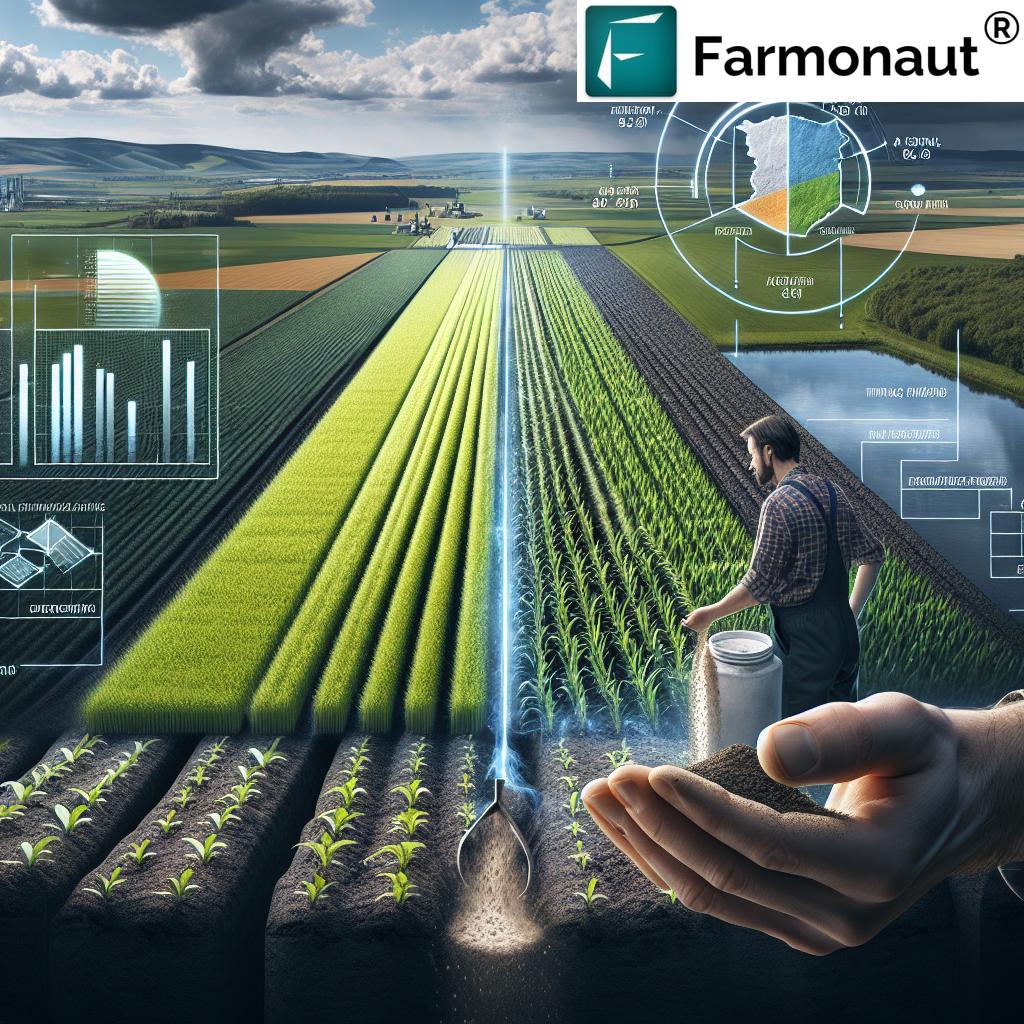EU-Mercosur Trade Agreement: Revolutionizing Global Agricultural Markets and Economic Growth
“The EU-Mercosur trade agreement impacts over 780 million consumers across both regions, potentially reshaping global agricultural markets.”
In a groundbreaking development that promises to reshape the landscape of international trade and agriculture, the European Union (EU) and Mercosur, the South American trade bloc, have successfully concluded negotiations on a comprehensive free trade agreement. This historic pact, years in the making, stands poised to revolutionize global agricultural markets and drive economic growth across both continents. As we delve into the intricacies of this agreement, we’ll explore its far-reaching implications for farmers, businesses, and consumers on both sides of the Atlantic.
Understanding the EU-Mercosur Free Trade Agreement
The EU-Mercosur free trade agreement represents a milestone in international agricultural trade, marking a new era of economic cooperation between Europe and South America. This pact aims to eliminate trade barriers, boost competitiveness, and open new markets for a wide range of goods and services. At its core, the agreement seeks to foster deeper economic ties, stimulate job creation, and promote technological innovation between the EU and Mercosur nations.
Key aspects of the agreement include:
- Elimination of tariffs on a vast majority of goods exchanged between the two regions
- Opening of new markets for European goods and services in South America
- Enhanced opportunities for South American agricultural producers in European markets
- Provisions for safeguarding vulnerable sectors and promoting fair trade
- Commitments to sustainable development and environmental protection
As we navigate through the complexities of this agreement, it’s crucial to recognize its potential to transform not only agricultural trade but also the broader economic landscape of both regions.
Impact on Global Agricultural Markets
The EU-Mercosur trade agreement is set to have a profound impact on global agricultural markets, reshaping trade flows and creating new opportunities for farmers and agribusinesses on both sides of the Atlantic. Let’s examine some of the key areas where we expect to see significant changes:
1. Market Access and Tariff Reductions
One of the most immediate and tangible effects of the agreement will be the substantial reduction or elimination of tariffs on agricultural products. This move is expected to boost trade volumes and create new export opportunities for producers in both regions.
- For EU exporters: Improved access to the Mercosur market for products such as wine, olive oil, and dairy goods
- For Mercosur exporters: Enhanced opportunities for beef, poultry, sugar, and ethanol in the EU market
These tariff reductions will likely lead to increased competition and potentially lower prices for consumers, while also challenging domestic producers to adapt and innovate.
2. Shift in Production Patterns
As markets open up, we anticipate shifts in agricultural production patterns as farmers and agribusinesses respond to new market signals and opportunities. This could lead to:
- Specialization in high-value crops or livestock where each region has a comparative advantage
- Increased investment in agricultural technology and efficiency improvements to remain competitive
- Potential displacement of some domestic production in favor of imports, particularly in sensitive sectors
3. Supply Chain Transformation
The agreement is likely to catalyze significant changes in agricultural supply chains, fostering greater integration between EU and Mercosur markets. We expect to see:
- Development of new logistics and distribution networks to facilitate increased trade
- Adoption of advanced technologies for traceability and quality assurance
- Increased collaboration between EU and Mercosur agribusinesses in areas such as research and development
In this evolving landscape, technologies like those offered by Farmonaut can play a crucial role in enhancing agricultural productivity and sustainability. Farmonaut’s satellite-based crop health monitoring and AI-driven advisory systems can help farmers in both regions optimize their production and adapt to changing market demands.
4. Standards and Regulations
The agreement includes provisions for regulatory cooperation and alignment of standards, which could have significant implications for agricultural trade:
- Harmonization of food safety and quality standards
- Recognition of geographical indications, protecting traditional European and South American products
- Increased emphasis on sustainable agricultural practices and environmental protection
These changes in standards and regulations may require adjustments from producers but could ultimately lead to higher quality products and improved consumer confidence.
Economic Growth Prospects
The EU-Mercosur trade agreement is expected to be a significant driver of economic growth for both regions. By opening up markets and fostering increased trade and investment, the agreement has the potential to create substantial economic benefits:
1. Trade Volume Increase
Analysts project a substantial increase in trade volumes between the EU and Mercosur countries as a result of the agreement. This growth in trade is expected to contribute positively to GDP growth in both regions.
2. Job Creation
The expansion of trade and investment opportunities is anticipated to lead to job creation in various sectors, including agriculture, manufacturing, and services. However, it’s important to note that there may also be job displacements in some sectors due to increased competition.
3. Investment Boost
The agreement is likely to stimulate increased foreign direct investment (FDI) flows between the EU and Mercosur countries. This could lead to:
- Modernization of agricultural practices and infrastructure
- Transfer of technology and know-how
- Development of new industries and value chains
4. Innovation and Productivity Gains
Increased competition and access to new technologies are expected to drive innovation and productivity improvements in both regions. This could lead to long-term economic benefits and enhanced competitiveness in global markets.
In this context, Farmonaut’s innovative agricultural technologies can play a crucial role in driving productivity gains and sustainable practices. Our satellite-based farm management solutions and AI-powered advisory systems can help farmers and agribusinesses adapt to the changing market landscape and optimize their operations.
Challenges and Concerns
While the EU-Mercosur trade agreement offers significant opportunities, it also presents several challenges and has raised concerns among various stakeholders:
1. European Farmers’ Concerns
Many European farmers, particularly in the beef and poultry sectors, have expressed apprehensions about increased competition from South American producers. There are concerns about:
- Potential market disruptions and price pressures
- Differences in production standards and costs
- Long-term viability of certain agricultural sectors in the EU
2. Environmental and Sustainability Issues
Environmental groups and some EU member states have raised concerns about the potential impact of the agreement on deforestation and climate change, particularly in the Amazon region. Ensuring that increased agricultural production doesn’t come at the cost of environmental degradation will be a key challenge.
3. Labor and Social Standards
There are concerns about differences in labor standards and social protections between the EU and Mercosur countries. Ensuring fair competition and protecting workers’ rights will be important considerations in implementing the agreement.
4. Political and Ratification Challenges
The agreement faces political hurdles in both regions. In the EU, countries like Poland have expressed opposition, citing concerns about the impact on their agricultural sectors. The ratification process in national parliaments could be complex and time-consuming.
“The historic EU-Mercosur deal is expected to eliminate tariffs on 93% of Mercosur exports to the EU.”
Opportunities for Agricultural Innovation
The EU-Mercosur trade agreement opens up exciting possibilities for agricultural innovation and the adoption of new technologies. As farmers and agribusinesses adapt to the changing market landscape, we anticipate increased demand for advanced agricultural solutions:
1. Precision Agriculture
The need for improved productivity and efficiency will likely drive greater adoption of precision agriculture techniques. Farmonaut’s satellite-based crop health monitoring and AI-driven advisory systems can play a crucial role in helping farmers optimize their production and resource use.
2. Sustainable Agricultural Practices
With increased focus on environmental protection and sustainability, we expect to see growing interest in technologies that support sustainable farming practices. Farmonaut’s solutions for resource management and carbon footprint tracking can help farmers and agribusinesses meet these new demands.
3. Supply Chain Transparency
As trade volumes increase and supply chains become more complex, there will be a greater need for traceability and transparency. Farmonaut’s blockchain-based traceability solutions can help ensure the integrity and transparency of agricultural supply chains spanning the EU and Mercosur regions.
4. Data-Driven Decision Making
Access to accurate, real-time data will be crucial for farmers and agribusinesses to navigate the new market dynamics. Farmonaut’s comprehensive data analytics and AI-powered insights can empower stakeholders to make informed decisions in this evolving landscape.
Comparative Analysis of EU-Mercosur Trade Agreement Impact
| Agricultural Sector/Economic Indicator | Impact on EU | Impact on Mercosur | Potential Challenges | Opportunities for Innovation |
|---|---|---|---|---|
| Beef | ↓ Increased competition for EU producers | ↑ Expanded market access for Mercosur exporters | EU farmer concerns, Quality standards | Traceability solutions, Sustainable practices |
| Soybeans | ↑ Cheaper inputs for EU livestock sector | ↑ Increased export opportunities | Environmental concerns (deforestation) | Precision agriculture, Sustainable farming |
| Citrus Fruits | ↓ Potential pressure on EU producers | ↑ New market opportunities in EU | Phytosanitary standards, Seasonality | Advanced storage and transport technologies |
| GDP Growth | ↑ Modest growth expected | ↑ Significant growth potential | Uneven distribution of benefits | Cross-border investments, Technology transfer |
| Job Creation | ↕ Mixed impact across sectors | ↑ Potential for new jobs in export sectors | Job displacement in some industries | Workforce training, Skill development programs |
| Technology Adoption | ↑ Increased need for innovation | ↑ Access to advanced EU technologies | Adoption costs, Knowledge gaps | Precision agriculture, IoT, AI in farming |
This table provides a concise overview of the potential impacts of the EU-Mercosur trade agreement across various sectors and economic indicators. It highlights the complex nature of the agreement, showcasing both opportunities and challenges for stakeholders in both regions.
The Role of Agricultural Technology
As we navigate the changing landscape of international agricultural trade, the role of agricultural technology becomes increasingly crucial. Farmonaut, as a leading provider of advanced agricultural solutions, is well-positioned to support farmers and agribusinesses in both the EU and Mercosur regions as they adapt to new market realities.
1. Enhancing Productivity and Competitiveness
In a more competitive market environment, farmers will need to optimize their production to remain viable. Farmonaut’s satellite-based crop health monitoring and AI-driven advisory systems can help farmers:
- Identify and address crop health issues early
- Optimize resource use, including water and fertilizers
- Make data-driven decisions to improve yields and reduce costs
2. Supporting Sustainable Agriculture
With increased focus on environmental protection and sustainability in the trade agreement, Farmonaut’s solutions can play a key role in promoting sustainable farming practices:
- Carbon footprint tracking to help agribusinesses monitor and reduce their environmental impact
- Resource management tools to optimize water usage and reduce waste
- AI-powered insights to support precision agriculture and reduce chemical inputs
3. Ensuring Supply Chain Transparency
As trade volumes increase between the EU and Mercosur, ensuring transparency and traceability in agricultural supply chains will be crucial. Farmonaut’s blockchain-based traceability solutions can:
- Provide end-to-end visibility of agricultural products from farm to consumer
- Help meet regulatory requirements and quality standards
- Build consumer trust through transparent and verifiable supply chains
4. Facilitating Data-Driven Decision Making
In an increasingly complex and dynamic market environment, access to accurate, real-time data will be critical. Farmonaut’s comprehensive data analytics and AI-powered insights can help stakeholders:
- Monitor market trends and adjust production accordingly
- Assess and mitigate risks associated with climate variability and market fluctuations
- Identify new opportunities for growth and diversification
By leveraging these advanced agricultural technologies, farmers and agribusinesses in both the EU and Mercosur regions can better position themselves to thrive in the new trade landscape created by the agreement.
Future Outlook and Recommendations
As we look to the future of EU-Mercosur agricultural trade, several key considerations and recommendations emerge:
1. Gradual Implementation
A phased approach to implementing the trade agreement could help mitigate short-term disruptions and allow stakeholders time to adapt. This could include:
- Gradual reduction of tariffs over several years
- Targeted support programs for vulnerable sectors
- Capacity building initiatives to help farmers and businesses adapt to new market conditions
2. Investment in Innovation and Technology
Both regions should prioritize investments in agricultural innovation and technology adoption to enhance competitiveness and sustainability. This could involve:
- Government incentives for the adoption of precision agriculture technologies
- Public-private partnerships to promote research and development in agritech
- Educational programs to train farmers in new agricultural technologies and practices
Farmonaut’s comprehensive suite of agricultural solutions can play a crucial role in this technological transformation. Our API and developer documentation provide the tools needed for integrating advanced agricultural technologies into existing systems and practices.
3. Sustainable Agriculture Focus
Ensuring that increased agricultural trade doesn’t come at the expense of environmental sustainability should be a key priority. This could include:
- Developing and enforcing robust sustainability criteria for agricultural products
- Promoting agroforestry and other sustainable farming practices
- Implementing traceability systems to ensure compliance with environmental standards
4. Ongoing Dialogue and Cooperation
Maintaining open channels of communication between EU and Mercosur stakeholders will be crucial for addressing challenges and maximizing the benefits of the agreement. This could involve:
- Regular forums for farmers, policymakers, and industry representatives from both regions
- Joint research initiatives on agricultural innovation and sustainability
- Mechanisms for addressing disputes and adjusting the agreement as needed
Conclusion
The EU-Mercosur trade agreement represents a watershed moment in global agricultural trade, offering the potential to revolutionize markets and drive economic growth across both regions. While the agreement presents significant opportunities, it also comes with challenges that will need to be carefully navigated.
As we move forward, the role of agricultural technology and innovation will be crucial in helping stakeholders adapt to this new trade landscape. Farmonaut stands ready to support farmers, agribusinesses, and policymakers with our advanced agricultural solutions, helping to drive productivity, sustainability, and transparency in this evolving market environment.
By embracing innovation, prioritizing sustainability, and maintaining open dialogue, we believe that the EU-Mercosur trade agreement can pave the way for a more prosperous and sustainable future for agriculture on both sides of the Atlantic.
Frequently Asked Questions (FAQ)
- What is the EU-Mercosur trade agreement?
The EU-Mercosur trade agreement is a comprehensive free trade pact between the European Union and the Mercosur bloc of South American countries (Brazil, Argentina, Paraguay, and Uruguay). It aims to eliminate tariffs, open markets, and promote economic cooperation between the two regions. - How will this agreement affect agricultural trade?
The agreement is expected to significantly boost agricultural trade between the EU and Mercosur by reducing or eliminating tariffs on various products. It will create new opportunities for exporters on both sides but may also increase competition in certain sectors. - What are the main concerns about the agreement?
Key concerns include potential negative impacts on European farmers due to increased competition, environmental issues related to deforestation in South America, and differences in production standards between the two regions. - How can agricultural technology help in adapting to the new trade landscape?
Agricultural technology, such as Farmonaut’s solutions, can help farmers improve productivity, adopt sustainable practices, ensure supply chain transparency, and make data-driven decisions to remain competitive in the changing market environment. - When will the EU-Mercosur trade agreement come into effect?
The agreement still needs to be ratified by the parliaments of all EU member states and Mercosur countries before it can come into effect. The timeline for this process is uncertain and could take several years.




















